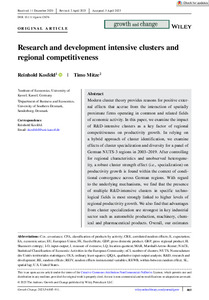Research and development intensive clusters and regional competitiveness
| dc.date.accessioned | 2024-03-06T14:21:55Z | |
| dc.date.available | 2024-03-06T14:21:55Z | |
| dc.date.issued | 2023-05-02 | |
| dc.identifier | doi:10.17170/kobra-202403069734 | |
| dc.identifier.uri | http://hdl.handle.net/123456789/15538 | |
| dc.description.sponsorship | Gefördert im Rahmen des Projekts DEAL | |
| dc.language.iso | eng | |
| dc.rights | Attribution-NonCommercial-NoDerivatives 4.0 International | * |
| dc.rights.uri | http://creativecommons.org/licenses/by-nc-nd/4.0/ | * |
| dc.subject | cluster diversity | eng |
| dc.subject | cluster specialization | eng |
| dc.subject | industry clusters | eng |
| dc.subject | productivity growth | eng |
| dc.subject | regional competitiveness | eng |
| dc.subject.ddc | 330 | |
| dc.title | Research and development intensive clusters and regional competitiveness | eng |
| dc.type | Aufsatz | |
| dcterms.abstract | Modern cluster theory provides reasons for positive external effects that accrue from the interaction of spatially proximate firms operating in common and related fields of economic activity. In this paper, we examine the impact of R&D-intensive clusters as a key factor of regional competitiveness on productivity growth. In relying on a hybrid approach of cluster identification, we examine effects of cluster specialization and diversity for a panel of German NUTS-3 regions in 2003–2019. After controlling for regional characteristics and unobserved heterogeneity, a robust cluster strength effect (i.e., specialization) on productivity growth is found within the context of conditional convergence across German regions. With regard to the underlying mechanisms, we find that the presence of multiple R&D-intensive clusters in specific technological fields is most strongly linked to higher levels of regional productivity growth. We also find that advantages from cluster specialization are strongest in key industrial sector such as automobile production, machinery, chemical and pharmaceutical products. Overall, our estimates particularly highlight the working of Marshallian externalities in productivity dynamics, while Jacobs-type spillovers tend to be partially realized. These findings indicate that some but not all cluster-based regional development strategies are promising policy tools to foster regional growth processes. | eng |
| dcterms.accessRights | open access | |
| dcterms.creator | Kosfeld, Reinhold | |
| dcterms.creator | Mitze, Timo | |
| dc.relation.doi | doi:10.1111/grow.12676 | |
| dc.subject.swd | Produktivitätszuwachs | ger |
| dc.subject.swd | Wettbewerbsfähigkeit | ger |
| dc.subject.swd | Regionalwirtschaft | ger |
| dc.subject.swd | Cluster <Wirtschaft> | ger |
| dc.type.version | publishedVersion | |
| dcterms.source.identifier | eissn:1468-2257 | |
| dcterms.source.issue | Issue 4 | |
| dcterms.source.journal | Growth and Change | eng |
| dcterms.source.pageinfo | 885-911 | |
| dcterms.source.volume | Volume 54 | |
| kup.iskup | false | |
| dcterms.source.articlenumber | 12676 |
Dateien zu dieser Ressource
Das Dokument erscheint in:
-
Artikel [1195]


